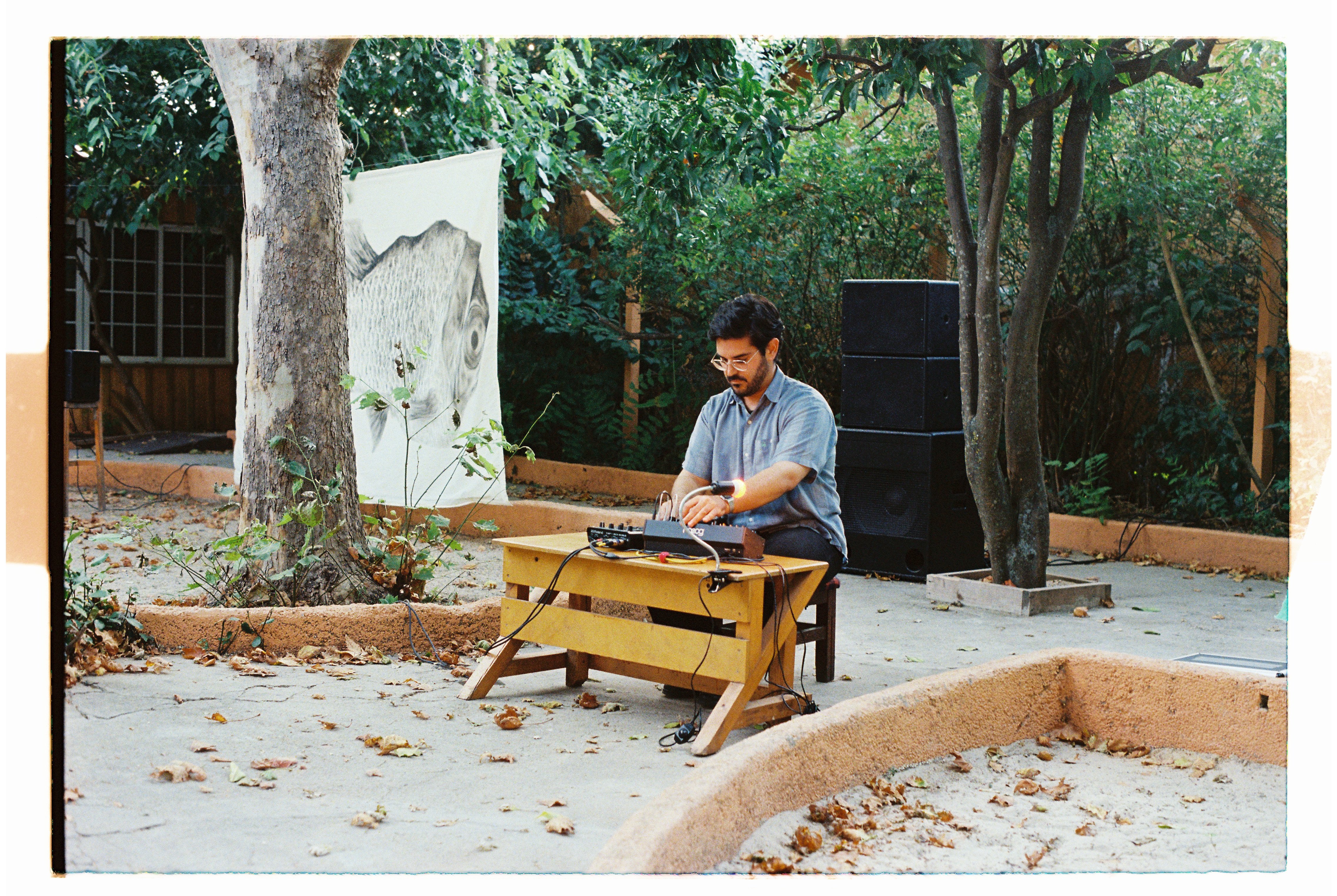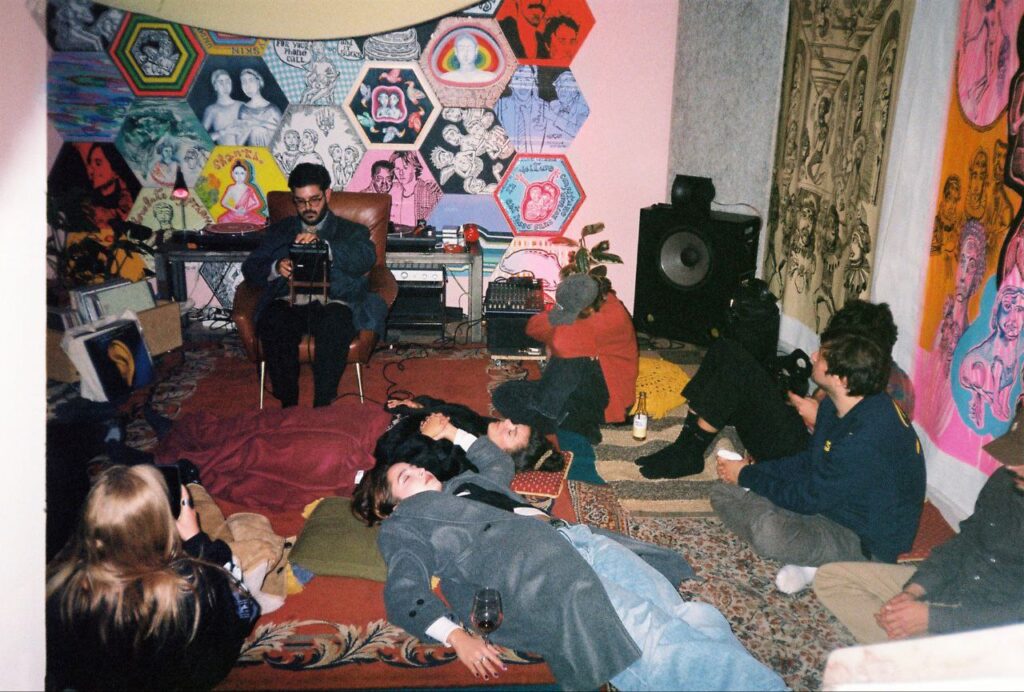
funcionário is the solo project of Pedro Tavares, primarily focused on day-to-day experiences and interactions—not as a continuous narrative but as a cohesive whole. It explores the power of sound as a bridge between memory and the imagination that interprets it. In this collage of different styles and approaches, the focus is on the profound endoesthesia that falls upon the astute listener: work and grieving as the essence from which all other sensations emerge. funcionário delves into all this, reaching the intimate core of contemporary working society, with its stopwatch shifts. Pedro is playing at the upcoming OUT.FEST in Barreiro in Portugal.
Hi Pedro. Where are you based, and what are your surroundings like? Do you have opportunities to perform and experience music there?
Hey!
I was born and lived most of my life in Setúbal, although I have yet to perform there despite making music for the past 10 years. The central region of Portugal, where I’m from, is very Lisbon-centric in terms of its live music offerings. That’s where I’ve performed and experienced most of the live music in my life. It’s also where most people from this area start off. There are still a few venues that are open to having you try out your first live performances there. These platforms really helped to develop my music—they served as testing grounds where I could showcase and refine what I wanted to share with everyone, sculpting my sound, one gig at a time.
I also don’t come from a musical background, nor do I have any family in music, although I do have to give credit to my brother and my best friend for suggesting I install Ableton Live 10 years ago—I wouldn’t be here without them.
I’d say I’ve only experienced a handful of impactful musical performances so far, but the ones that did strike a chord inspired me to keep developing my work and gave me a lot of strength to keep pushing forward with this music thing.
Your solo project, funcionário, is inspired by day-to-day experiences and interactions. Can you talk about these? How does the project inspire you and in what ways?
I worked out the vision for this project while commuting between my hometown, Setúbal, and the university I studied at in Lisbon. The bus rides allowed my thoughts to flow, and I really had a lot of time to think and rethink the small details of interactions I experienced or observed, as well as reflect on my friend’s lives and my own. This translated into me experimenting with Ableton on my laptop, trying to get familiar with all its nooks and crannies while thinking all that through. I was really looking for loops, pads and chords I could think to.
What is the relationship between memory and imagination in your work?
Memory gets foggy fast, and remembering something over and over again on a loop makes you embellish the stories you convince yourself actually happened. When you repeat the same journey daily, certain things are bound to pop up again and again, and this constant rethinking opens the way for roadblocks and resolutions. For me, music has always been the way to navigate life’s biggest decisions. It helps me switch off and clock out when I need to lose myself for a while in my world and return feeling refreshed.
How do you create your music? Does it happen more in an everyday context, or do you rather create music when you have particular inspiration? What is your musician’s modus operandi?
I no longer take those long bus rides, and I don’t create music daily now, but I do still check in often, in a more random fashion. Usually it’s after work, or on the weekends/days off, or whenever I find the time, really. Inspiration has never been an issue, and despite spending less time making music, I’ve never been more prolific. Although things don’t come out great all of the time, I believe it’s just a matter of repetition and persistence, balanced with the right breaks to reflect and analyse, and then create again. I’ve never really struggled with any type of artist’s block—at least not yet. My MO is literally: record something (usually synths) and sample it, chop it, screw it, add fx, add layers, leave the project for a month, come back and compose it, export, and then use that track as a sample to repeat the cycle until it sounds right. On a lucky day, I end up with two or three new future tracks from a single session.
Your press photo depicts you sitting in a room—almost like a bedroom or a private house—playing while the audience is mostly lying down, drifting away. The scene looks very peaceful. Why did you decide to use this photo to represent your project, and do you have an ideal scenario for the audience to receive your work?
The photo was taken in a small gallery in Lisbon, and it mostly illustrates how I wish the experience to be. I dream of the day when not a single word is said at a concert of mine, not because of a dictatorial rule, but as an expression of a shared stillness. I really want to bring forth a performance that walks the line between boring, repetitive ambient and a fresh/full sound. Ideally, I’d love people to use my live sets as a time to think about everything they’ve been putting off in the back of their minds. A kind of repentance, maybe? They can do it standing up or sitting/lying down—I leave it up to them.
The physical setting is just there to support the mental space; the ideal scenario is simply whatever allows people to wander in their heads.

You have a new album out in October, called “horizonte”. Can you talk about this release?
First of all, a big up to the guys at Holuzam for always giving me a free platform to showcase my work. The world needs more people like them.
And a big thank you to my lovely girlfriend, who helped bring the artwork’s vision to life and designed the LP.
As for the music, this was my first time doing 99% of everything with the gear I use to play live, without too much sampling and post-production. I was sort of aiming for an album I could play live. Even though I don’t do it for the whole duration of the gig, the first half is always the kind of experimentation you can hear on the album. It’s special in that sense. It’s the first time I’ve tackled album-making as a “studio session” and not as a collection of different songs I had in a folder on my laptop. I wanted it to sound strong and colourful.
What else are you currently working on?
I have a lot of new music I’ve been working on for funcionário,
I also have other projects on the go, such as Tempo Livre with Luís Neto from the turva label. We’ve got an LP coming out in September, which is impossible to label as anything in particular. We use synths, sampling of acoustic string and wind instruments, drums, and voice.
I also collaborate with Rodolfo Sobral, an experimental guitarist from my district. We’ve done two cassettes together and are now starting to experiment with some new things for possible future releases.
Interview by Lucia Udvardyova
Lead image by Leonor Gomes @leomg_01